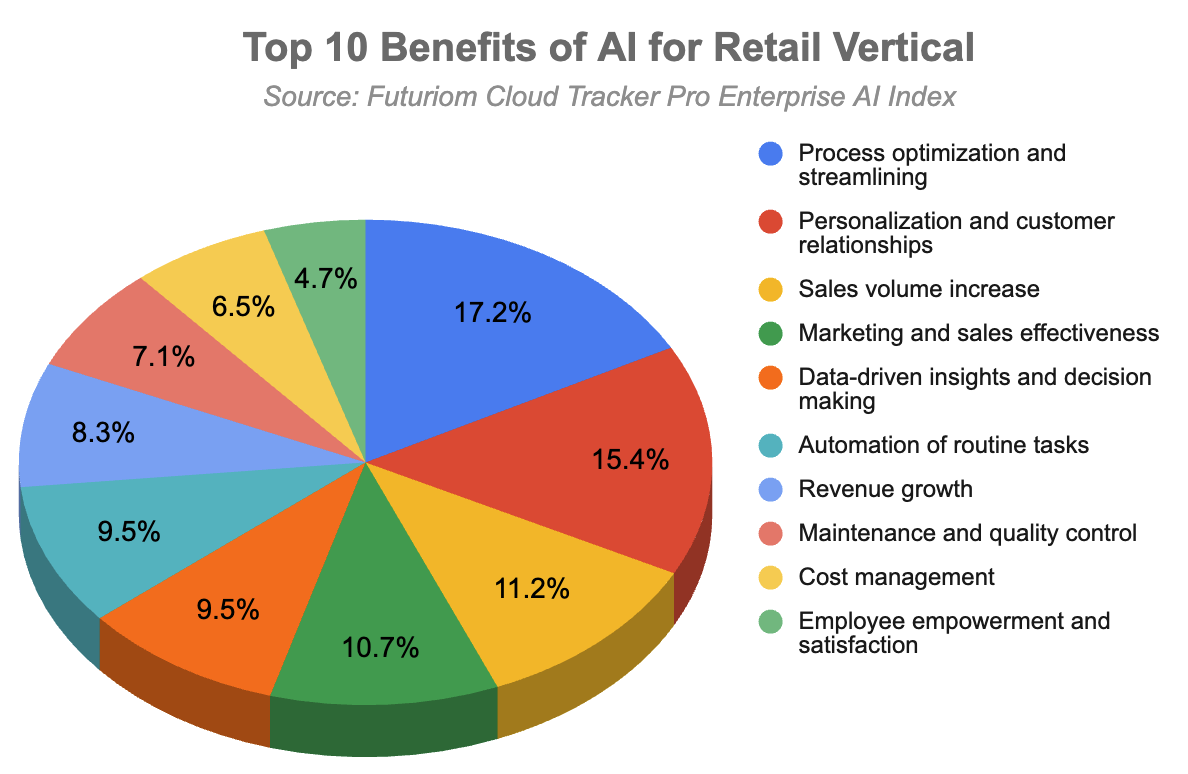Enterprise AI Profile: Walmart

(Editor's Note: We will occasionally publish free profiles taken from our Enterprise AI Index, which is a data service that is part of Cloud Tracker Pro. The full database and library of profiles is available to subscribers.)
Futuriom Enterprise AI Profile
Organization: Walmart Inc.
Vertical industry: Retail
Description: Walmart, the retailer giant headquartered in Bentonville, Arkansas, each week sells to 255 million customers in over 10,750 stores and on e-commerce websites in 19 countries. It employs over 2.1 million people worldwide. CEO Doug McMillon recently said that due to AI, that employment roster will stay relatively flat over the next three years, as some jobs are lost to automation while others are added.
As this plays out, Walmart employees and customers are likely to benefit from Walmart's AI efforts, which have affected every aspect of its business. AI is infused in applications for shoppers, administrative staff, suppliers, associates in stores, and software developers.
Walmart’s AI push began in 2015 with the adoption of AI-powered logistical planning. Its resulting Route Optimization tool is now available to other companies through its Walmart Commerce Technologies division, which provides SaaS offerings based on Walmart-developed solutions.
Starting around 2019, Walmart expanded its use of AI to include chatbots and recommender systems to help associates with day-to-day issues, such as locating inventory in stores. With help from Microsoft’s Azure OpenAI Service, Walmart also created a series of generative AI-based mobile apps to aid customers in making product selections.
Over time, Walmart developed a proprietary machine learning and AI platform called Element and created its own LLMs, such as Wallaby, a series of models used to develop customer-facing applications. The company also made use of many third-party products, including Microsoft Azure OpenAI Service, Google Cloud AI, and SymphonyAI, among many others.
By 2025, the company’s multiple task-specific tools were organized in a series of “super agents” that each pack multiple tools for specific groups of users: Sparky is an agent for customers, enabling them to explore, choose, and order products as well as plan events and find recipes, among other tasks.
The Associate Agent offers a range of resources for Walmart workers, including HR services and assistance with routine tasks such as scheduling and gathering data. It also includes a translation tool supporting 44 languages, which enables associates to converse with customers from multiple regions and nationalities.
Marty, the partner agent, supports Walmart’s online suppliers, sellers, and advertisers, helping with onboarding, order management, inventory analytics, and advertising campaign optimization. (This agent is particularly strategic: Walmart plans for e-comerce to account for 50% of its revenue within five years.)
A Developer Agent is geared to software engineers, providing a full CI/CD pipeline and help with building, testing, and launching applications as well as exploring and implementing AI.
Walmart has also extended AI into the physical management of its stores. The retailer has deployed NVIDIA's Omniverse as well as digital twin technology from vendors Nfinite and Willow to create digital twins of its retail stores (including Sam's Clubs) and distribution centers. It uses the twins to optimize store layouts, forecast inventory needs, and predict maintenance requirements on its buildings.
AI Platforms and Models Used: Proprietary platform (Element) and multiple proprietary LLMs; Microsoft Azure OpenAI Service, NVIDIA Omniverse, among others.
Key Success Factors: Use of Walmart's new super agents has reduced customer problem resolution times by 40% and reduced the task of planning shift attendance by Walmart associate team leads from 90 to 30 minutes. Regarding digital twins, use of Willow alone allowed Walmart to identify over 800 issues inside its built estate, save 20% in critical downtime costs, and save $1.4 million within a six-month period.
Note: According to Futuriom’s data, collected in over 150 records in our Enterprise AI Index, process optimization and streamlining topped the list of AI’s benefits for the retail vertical, which according to our research is the top vertical sector for AI.

Futuriom Take: Walmart’s extensive deployment of AI over a years-long period has catapulted it into one of the top companies in AI’s most active vertical sector.
























